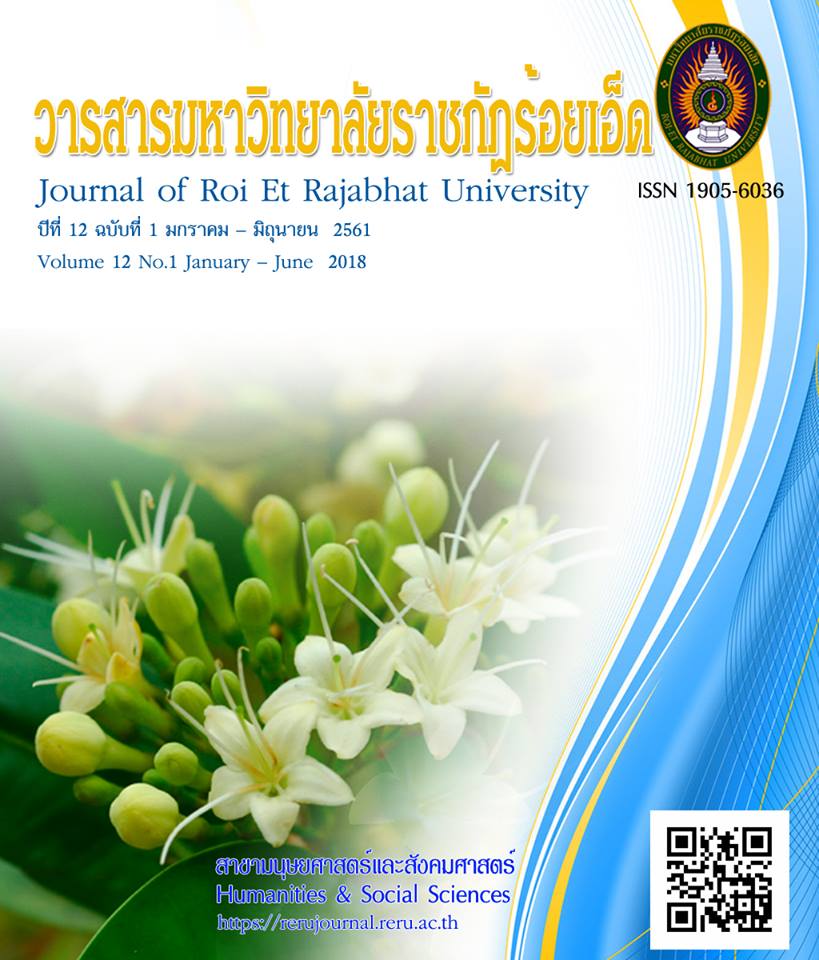The Effectiveness of Managerial Accounting Information Affecting Profitability of Business
Keywords:
Effectiveness, Managerial Accounting Information, ProfitabilityAbstract
Nowadays, it is known as the era of globalization, causing free trades and limitless effects on the state of economic competitions which tends to be stronger. Thus, business corporates must prepare and adjust themselves to confront any situation which may occur. They need to invent a tool or strategy to provide competitive advantages. This contributes to the ability to make a profit. Moreover, it is necessary to seek tools or strategies for the administration to be successful and to sustainably grow. One important factor is the accounting information system, especially the managerial accounting information. The objectives of this study were 1) to study the effectiveness of managerial accounting information affecting profitability, and 2) to study the trend in employing managerial accounting information in the future. In this study, a constructed questionnaire was used to collect data from 122 companies listed on the Market for Alternative Investment (MAI). The statistic used to analyze the data was the multiple regression analysis at a significant level of .05. It was found as follows; 1) the analysis of data for decision and the analysis of capital expenditure affected the gross profit margin, 2) the concept and cost classification and the analysis of capital expenditure impacted the earnings before interest and tax margin, 3) the responsibility accounting and transfer pricing, the analysis of data for decision and the analysis of capital expenditure affected the net profit margin, and 4) the biggest trend in applying managerial accounting information in the future was Corporate Social Responsibility (CSR).
References
จุฑามน สิทธิผลวนิชกุล. (2553). วิวัฒนาการของการบัญชีบริหารสู่การเปลี่ยนแปลงในมุมมองสำหรับผู้บริหาร. วารสารวิชาชีพ บัญชี, 6(17), 90-97.
ตลาดหลักทรัพย์แห่งประเทศไทย. (2559). ข้อมูลบริษัท/หลักทรัพย์. สืบค้นเมื่อ 26 กรกฎาคม 2561, จาก https://www.set.or.th/th/company/companylist.html
เบญจมาศ อภิสิทธิ์ภิญโญ. (2557). การบัญชีเพื่อการจัดการ. กรุงเทพฯ: ส.เอเซียเพรส (1898).
ปัญจพร ศรีชนาพันธ์. (2555). รูปแบบความเป็นผู้นำ ระบบการบัญชีบริการและการดำเนินงานการบริหารจัดการ. วารสารมหาวิทยาลัยราชภัฏลำปาง, 1(1), 37-48.
วรรณวิมล ศรีหิรัญ. (2553). ปัจจัยที่มีผลต่อประสิทธิภาพการใช้สารสนเทศทางการบัญชีของผู้บริหารในตลาดหลักทรัพย์ แห่งประเทศไทย. โครงการวิจัย คณะบริหารธุรกิจ. กรุงเทพฯ: มหาวิทยาลัยเทคโนโลยีราชมงคลพระนคร.
สุวรรณ หวังเจริญเดช. (2557). กลยุทธ์การบริหารต้นทุนในยุคโลกาภิวัฒน์. วารสารนักบริหาร, 34(1), 60-68.
สมนึก เอื้อจิระพงษ์พันธ์. (2557). การบัญชีบริหาร. กรุงเทพฯ: แมคกรอ-ฮิล.
Cronbach, Lee J. (1946). Response sets and test validating. Educational and Psychological Measurement, 6(4), 475-494.
Don Hofstrand. (2009). Understanding Profitability. (Online). Available : https://www.extension.iastate. edu/agdm/wholefarm/html/c3-24.html
Hilton, Ronald W. (2009). Managerial Accounting. New York: McGraw-Hill.
Libby, Theresa & John, Waterhouse H. (1996). Predicting change in management accounting Systems. Journal of Management Accounting Research, 8, 137-150.
Nunnally, Jum C. (1978). Psychometric Theory. New York: McGraw-Hill.
Wall, Friederike & Greiling, Dorothea. (2011). Accounting Information for Managerial Decision-Making in Shareholder Management Versus Stakeholder Management. Review of Managerial Science, 5(2), 91-135.
Taro, Yamane. (1973). Statistics: An Introductory Analysis. New York: Harper and Row Publication.
Downloads
Published
How to Cite
Issue
Section
License
บทความที่ได้รับการตีพิมพ์เป็นลิขสิทธิ์ของวารสารมหาวิทยาลัยราชภัฎร้อยเอ็ด
ข้อความที่ปรากฏในบทความแต่ละเรื่องในวารสารวิชาการเล่มนี้เป็นความคิดเห็นส่วนตัวของผู้เขียนแต่ละท่านไม่เกี่ยวข้องกับมหาวิทยาลัยราชภัฎร้อยเอ็ด และคณาจารย์ท่านอื่นๆในมหาวิทยาลัยฯ แต่อย่างใด ความรับผิดชอบองค์ประกอบทั้งหมดของบทความแต่ละเรื่องเป็นของผู้เขียนแต่ละท่าน หากมีความผิดพลาดใดๆ ผู้เขียนแต่ละท่านจะรับผิดชอบบทความของตนเองแต่ผู้เดียว





